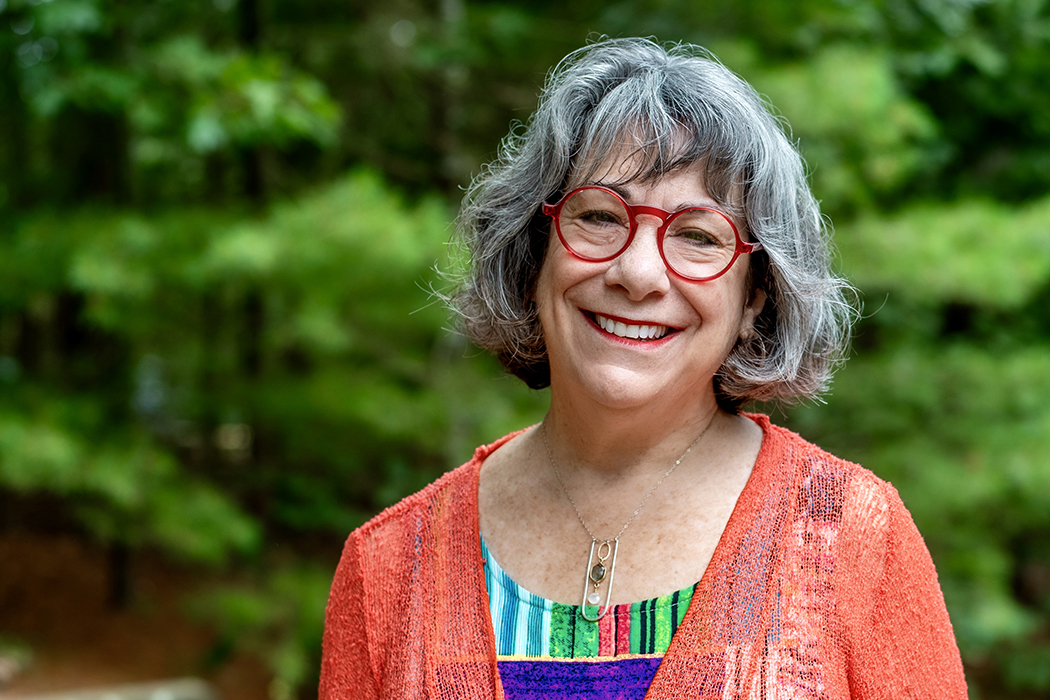
Robin Warsh plans to retire from BCSSW in May after more than 30 years of service to the University. Courtesy photo.
Over the past 30 years, the field of social work has evolved to place a greater emphasis on hard science.
So says Robin Warsh, who’s witnessed the transformation of the helping profession as a stalwart at the Boston College School of Social Work since 1994.
“I think that the field is taken more seriously as clinically sound and social workers are seen as true experts in providing mental health care,” says Warsh, a professor of clinical practice who plans to retire at the end of May after more than 30 years of service to the University. “We’ve really brought hard science into a field that was softer on that compared to when I was first trained.”
Warsh has brought an evidence-based approach to teaching since joining the faculty as an assistant professor in the mid-90s, blending scholarship and case studies with role-playing activities to enhance learning for students working with clients.
For years, she’s fine-tuned the syllabi for Basic Skills in Clinical Social Work, Psychosocial Pathology, and Clinical Practice with Adults, replacing old and outdated materials with new Podcasts, YouTube videos, and peer-reviewed publications that, she says, “honor humanity in all its forms.”
“My students today are conversant in the neurobiology of trauma and know how to work with the brain, the body, and emotions to bring healing,” says Warsh, who has regularly mentored part-time faculty who teach the three courses that she’s worked to coordinate. “Students are conversant in neurodivergence, autism spectrum disorder, and understanding the numerous ways human brains work that go beyond pathology.”
Her teaching style blends structured lectures with group discussions, with an emphasis on connecting practical learning in the field to theoretical learning in the classroom.
Warsh often shares case studies from her private practice focused on helping individual adults and couples navigate divorce, childhood trauma, and attachment disorders, a strategy that allows students to see how the concepts they learn in class can be applied in clinical settings.
“My style truly combines strong didactic teaching with the opportunity for students to chew on the material,” says Warsh, who has a taken trauma-informed approach to her practice since she opened it in 1995, helping clients understand their childhood experiences so they can lead happier, healthier lives as adults. “I’m either demonstrating work with a client or they are talking with each other about their work with clients.”
“Growth happens when you do things you feel unqualified to do. Opportunity knocks, but it pays to have the biggest door that you can find.”
About 10 years ago, Warsh designed Internal Family Systems Therapy: A Contemporary Approach for Working with Individuals, Couples, Families, and Groups. This course, which she describes as her crowning achievement at BC, provides students with a non-pathologizing approach to identifying and unburdening the faulty beliefs people carry from childhood trauma and replacing them with self-led resources, such as courage, compassion, and curiosity.
“A decade ago, the course was pretty avant-garde,” says Warsh. “But I had the faith and trust of the administration that if I was suggesting it, it was going to be done well.”
And it was. Today, Internal Family Systems Therapy is one of the most popular courses at BCSSW, offered to students three times per year.
For the past 15 years, Warsh has chaired BCSSW’s Academic Standards Review Committee, where she’s played a key role in supporting struggling students and helping them get back on track.
Some students have returned to campus to thank her for her support, saying that what they’ve learned from the esteemed professor has stuck with them long after they submitted their final papers.
“I have had the pleasure of having students come up to me that I haven’t seen in the classroom for more than 10 years and tell me that what they learned in my classes is still with them to this day,” says Warsh. “I believe that I have been well trained, and to be able to share that with students who are smart, committed, dedicated, and ethical is a rare professional pleasure that gives me a lot of joy.”
Warsh advises current students to say “yes” to new opportunities, even if they’re not sure they can live up to the task.
“Growth happens when you do things you feel unqualified to do,” she says, quoting a well-known pastor named Andy Stanley. “Opportunity knocks,” she adds, “but it pays to have the biggest door that you can find.”
Although Walsh is retiring from BC, she’ll have plenty of opportunities to flex her social work muscles in the coming years. She plans to keep her private practice open for the foreseeable future. She’s also booked virtual business trips to Egypt, South Korea, Spain, and Israel, where she’ll give online lectures on Internal Family Systems therapy to psychotherapists in those countries.
“Working with couples is really my jam,” says Warsh. “So between my practice and my teaching of therapists, I’ll be busy.”
She predicts that the next generation of social workers will not only continue to embrace evidence-based approaches in their work with clients but also place a strong emphasis on the generosity of spirit, a hallmark that has long defined the helping profession.
In this way, the future of social work looks similar to its evolution over the past 30 years, when Warsh was making her mark on the Heights.
“I think that we are going to continue to honor and include science without losing our hearts,” she says, “because that’s just as important when working with human beings who are suffering and in need of healing.”


